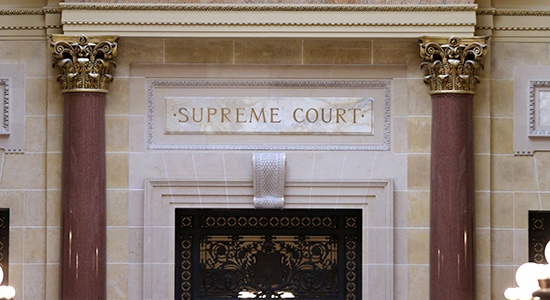
June 29, 2017 – A criminal defendant properly served a subpoena on a witness by leaving the subpoena at the witness’s abode, the Wisconsin Supreme Court has concluded, reversing a state appeals court decision that the subpoena was improperly served.
The witness did not appear at a hearing on Keimonte Wilson Sr.’s motion to suppress evidence. Wilson believed the witness could contradict police officers, who said they observed Wilson enter and leave a known drug house before approaching Wilson’s vehicle and obtaining voluntary consent to search. Police found cocaine and cash.
The witness who did not appear would have corroborated the testimony of another witness who was inside the vehicle and said police approached the truck with guns drawn and searched them without voluntary consent, Wilson argued on appeal.
In State v. Wilson, 2017 WI 63 (June 22, 2017), the supreme court majority interpreted subpoena statutes in favor of Wilson, who will now have an opportunity to present the witness on remand to determine whether certain evidence should be suppressed.
Section 883.05 says “[a]ny subpoena may be served by any person by exhibiting and reading it to the witness, or by giving the witness a copy thereof, or by leaving such copy at the witness’s abode.” The state argued that another subpoena statute applied.
The state argued that Wilson was required to first make a reasonable attempt to serve the witness personally before it could rely on substituted service.
But a five-justice majority did not agree. Justices Annette Ziegler and Michael Gableman dissented, concluding that Wilson forfeited his right to appeal the issue.
Wilson Arrested
Wilson was charged with possession with the intent to deliver between five and 15 grams of cocaine as a second offense. On the day of his arrest, police officers observed him parked in a vacant lot, then exit his vehicle and walk toward a known drug house.
When he reappeared, three police officers approached the vehicle that contained Wilson and another person and allegedly obtained his consent to a search of his person, which then resulted in the officers finding the cocaine and cash.
At trial in Milwaukee County, Wilson filed a suppression motion, contending there was no basis for the stop and that he had not consented to the search. At the suppression hearing, there was a disputed factual issue regarding whether the police officers had their guns drawn when they approached the truck and searched Wilson.
The defense called one witness, Darryl Roberts, who was sitting in the truck with Wilson, and who testified that two of the officers arrived with their guns out.
A second witness, Jacqueline Brown, failed to testify at the hearing. She had been served by leaving a copy of the subpoena with her daughter at her residence, but had told defense counsel that she was unable to leave work to attend the hearing.
The circuit court noted that whether the officers had their guns drawn “does seem to be the issue in this case.” And although Brown would have offered testimony on this key issue, the court concluded that the service of the subpoena – a single attempt that used substituted service – was inadequate.
 Deborah Spanic, Marquette 2004, is a guest writer for the State Bar of Wisconsin. She can be reached by email.
Deborah Spanic, Marquette 2004, is a guest writer for the State Bar of Wisconsin. She can be reached by email.
However, the circuit court noted that even if Brown had testified, it would likely have not assisted the court in its ruling because Roberts’ and Wilson’s testimony was inconsistent, and the officers’ testimony was more credible.
Wilson subsequently pleaded guilty and was sentenced to five years imprisonment. Wilson then filed the postconviction motion, arguing the court erred in determining the service of the subpoena was inadequate.
In addition, he asserted he received ineffective assistance of counsel because trial counsel failed to make an argument that the subpoena was properly served. The circuit court denied Wilson's motion, and the court of appeals affirmed the circuit court’s judgment and order.
Analysis
In drafting the majority opinion, Justice Ann Walsh Bradley noted the core issue in this case is the service of a subpoena on a witness in a criminal case.
The state relied on two statutes set forth in the civil rules of procedure, Wis. Stat. §§ 805.07 and 801.11. Section 805.07 states that a subpoena may be served in accordance with Chapter 885. However, by reference to Wis. Stat. § 801.11(1)(b), it excepts from that general premise the manner in which substituted personal service of a witness subpoena must be accomplished.
“When read together with Wis. Stat. § 805.07, these two rules of civil procedure instruct that substituted service may be used to serve a subpoena only if after reasonable diligence a witness cannot be personally served,” Bradley noted.
Wilson, on the other hand, relied on two statutes set forth in the rules of criminal procedure, sections 972.11 and 885.03.
Section 972.11 initially provides that the rules of evidence in civil procedures shall apply to criminal proceedings, but then it expressly states that Chapter 885, which governs the service of subpoenas, shall apply in all criminal proceedings.
Chapter 885 provides for three methods for serving a subpoena, including by leaving a copy at the witness’s abode.
“Admittedly, Wis. Stat. § 972.11(1) points us in two different directions,” Justice A.W. Bradley stated. However, “we find guidance in this court’s prior instruction that ‘where a specific statutory provision leads in one direction and a general statutory provision leads in another, the specific statutory provision controls.’”
“Because Wis. Stat. § 972.11(1) explicitly references Chapter 885, it is the more specific textual provision,” A.W. Bradley added. “Thus the service of a witness subpoena in a criminal proceeding is controlled by Wis. Stat. § 885.03, rather than by the rules of civil procedure.”
“This does not mean, however, that a party is precluded from employing substituted service with reasonable diligence,” Bradley noted. “In many circumstances it may appear to be the prudent way to proceed. However the statute as written does not mandate it.”
As to Wilson’s claim of ineffective assistance of counsel, the court ruled that, “We need not determine whether Wilson received ineffective assistance of counsel because Wilson prevailed on his statutory interpretation argument,” Bradley stated.
The court found the circuit court erred, and reversed and remanded for continuance of the suppression hearing.
Dissent
Justice Ziegler drafted the dissent, joined by Justice Gableman, noting that “[e]ven if, as the court today concludes, the circuit court below erred in its assessment of the validity of the subpoena of Jacqueline Brown, Wilson failed to object to that error.
“Under well-established precedent, Wilson therefore forfeited the right to direct review of the alleged error and this court will only inquire into whether Wilson’s counsel was constitutionally ineffective in neglecting the challenge to the circuit court’s ruling on the subpoena,” Ziegler added.
“Wilson’s attorney was asked by the circuit court point-blank if he wished to object to the circuit court’s ruling on the subpoena, and the attorney declined to do so,” Ziegler noted. “The absence of any objection warrants that we follow ‘the normal procedure in criminal cases,’ which ‘is to address waiver within the rubric of the ineffective assistance of counsel.’”
Ziegler then conducted an analysis of Wilson’s ineffective assistance of counsel claim, concluding that it failed because he did not demonstrate that he was prejudiced by his counsel’s performance.
“To show prejudice Wilson must establish that 'there is a reasonable probability that, but for counsel’s unprofessional errors, the result of the proceeding would be different,'” Ziegler noted.
“The circuit court made clear that it found Officer Savigan and Officer Hunter to be highly credible witnesses and found their testimony to be much more credible and believable than Mr. Wilson and Mr. Roberts,” Ziegler added. “Thus, had Brown testified, her testimony would likely have been inconsistent with either Wilson’s account, Roberts’ account, or both.”
